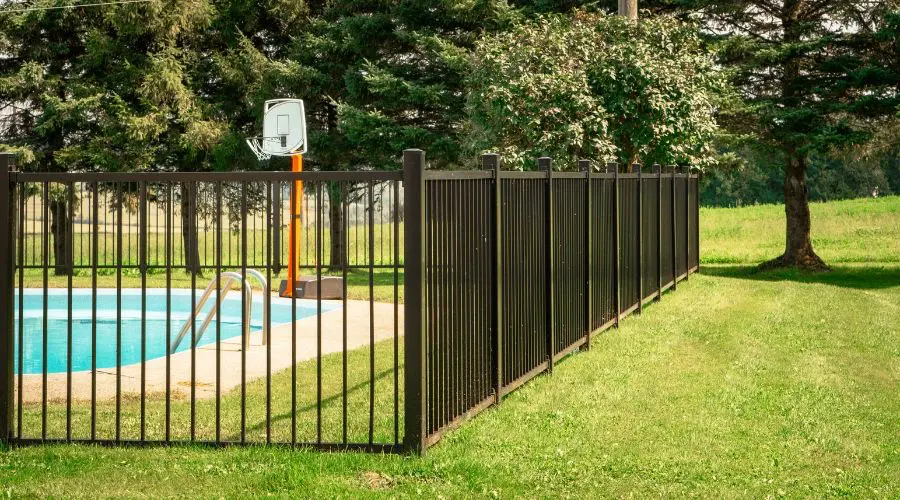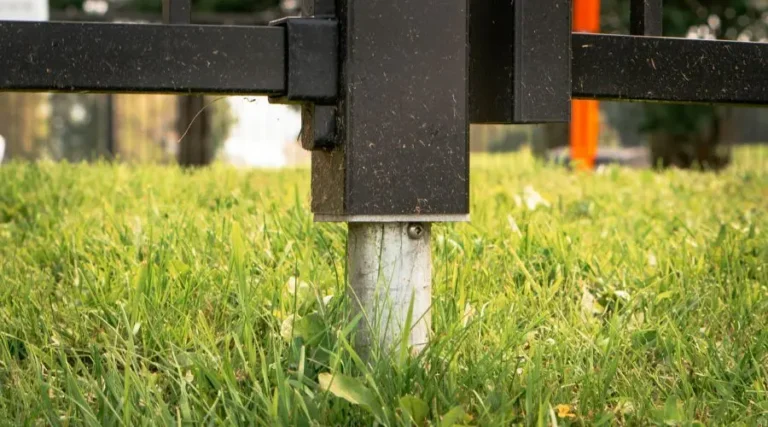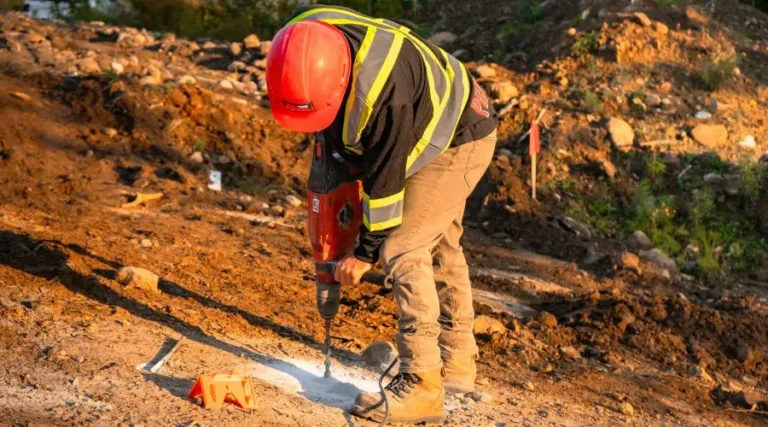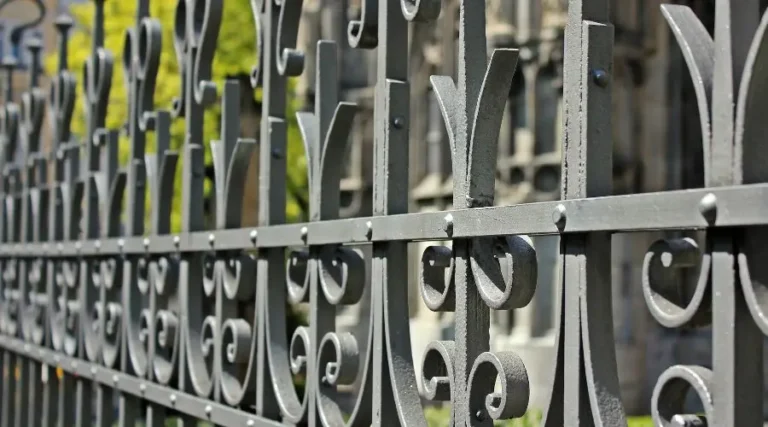You would like to make your yard more private, but you don’t know how to choose between different types of fences? When you decide to border your yard, you may pick a wood fence, a chain-link fence, vinyl or even iron, but what about the foundation?
You have to think about what kind of foundation would be best for your fence. Concrete is not the only option available. Screw piles are actually a fast and safe way to start the installation of any type of fence.
- In this article, we explain why screw piles for fences are a great choice when it comes to installing a new fence on residential or commercial land.
The foundation is crucial for building a sturdy fence that will remain stable over time.

What Are Screw Piles For Fences?
Screw piles for fences are pretty much like any other screw pile. Length, diameter, and other specificities vary according to the load-bearing capacity you need for your fence. There are different sized piles for different applications.
Screw piles are also called helical piles. They are like a very long and large steel screw made of:
- A long metal shaft.
- A welded large helical plate (corkscrew-style).
- High-strength steel.
This design helps disperse the weight of the load into the soil. Helical piles can be used for a wide variety of applications including fence posts. They don’t require the use of concrete. The back pressure built up while screwing them into the ground holds them.
How Are Screw Piles For Fences Installed?
Installing screw piles is not usually a DIY project. The reason is simple: special equipment is needed to drive the screw into the ground.
Most certified installers use a drive motor head attached to a mini excavator. Sometimes, a regular excavator or a skid steer is preferable. As the pile is screwed into the ground, it creates back pressure. The machine can measure torque, and as soon as the proper torque is reached, the installers stop driving the screw into the ground. The depth of the installation will vary according to the type of soil.

Concrete VS Screw Piles For Fences
Installing helical piles is faster and more environmentally friendly than any concrete foundation. The equipment is compact and there is no need for digging, which means there is almost no disturbance of the soil. In other words, concrete foundations necessitate excavation, while screw piles do not.
Screw piles for fences also have immediate load-bearing capacity. You can install your fence right after and do not need to wait a few days. Concrete-supported fence posts take more time to cure.
Moreover, screw piles can be installed in almost any weather. You don’t have to wait for spring to show up! Concrete-supported posts need a temperature above 5°C. Screw piles for fences can be installed much earlier in the season, and sometimes even in the winter.
Do you have sloped terrain, poor drainage or any other difficult soil? Sometimes, it’s simply impossible to pour concrete. But helical piles are much more adaptable and can be installed in a wide range of soils! Using helical piles, you are able to build a fence in difficult areas.
What Are the Benefits of Screw Piles For Different Types of Fences?
Are screw piles appropriate for any type of fence? Yes, but the requirements may vary. Here’s a comprehensive breakdown for different fence types:
| - | Wood fence | Vinyl fence | Iron fence | Chain-link fence |
|---|---|---|---|---|
| Affordability of the fence | Affordable | Higher material costs | Higher costs | Most economical fence option |
| Screw Pile Type | Standard 2.875 inches diameter | Standard 2.875 inches diameter | May require larger diameter piles (3 to 4 inches) for heavier iron fencing | Standard 2.875 inches diameter |
| Benefits | Screw piles prevent rot at ground level | Vinyl and screw piles won't corrode or rot | Metal can withstand extreme weather conditions (such as high winds) | Excellent resistance to fence tension forces |
Typically, screw piles for fences have a diameter of 2.875 inches. Most of them are 6 feet long, but you can add an extension if deeper installation is needed. It is better to choose piles made of hot-galvanized steel for corrosion resistance, but there are a variety of steel grades to choose from. To make sure your fence is stable and can resist horizontal forces, don’t plan for more than 6 feet between each pile.
Privacy fences have higher requirements. They are typically made of wood or vinyl and because they catch more wind, they require stronger foundations. Screw piles with a larger diameter (3 to 4 inches) are recommended due to wind load. Also, if the panels are very tall, closer spacing (4 to 5 feet instead of 6 feet) may be needed.
Wood Fence
Choose a wood fence if you want to customize it: height, width, style, and color can be customized according to your taste. Wood is also affordable and environmentally friendly.
Vinyl Fence
If you seek complete privacy, vinyl fences are excellent. Vinyl is about five times stronger than wood, and no maintenance is needed. It won't blister, rot, or peel. Both vinyl and galvanized steel screw piles resist weathering, which makes it an excellent choice.
Iron Fence
Iron will give your yard an exquisite look. You can also get ornamental iron, which is in fact steel instead of iron. Metal fencing will last for decades, and it also works great if your property has an uneven grade.
Chain-Link Fence
A chain-link fence is the most economical option. Your fence will be resistant, and you can always add slats if you want more privacy.

Screw Piles For Fences Installation: DIY or Hire Professionals?
Helical piles can be bought in almost any hardware store. However, this does not mean that you should go ahead and install them yourself. An improperly installed helical pile can put your structure at risk of collapsing.
Piles sold in stores usually support a load of 2,500 to 4,000 pounds depending on soil type. You can get 6 feet long piles for about $50, and extensions for about $15. They often use a baked powder coating finish instead of galvanised steel.
If you have no experience in screw piles installation, you should hire professionals. Otherwise, you will have to rent special equipment to screw the piles and measure torque.
Screw piles for fences are relatively easy for a professional to install, because they have training and experience in this type of installation.
Screw Piles For Fences – Get Quotes Now!
Whether you want a durable wood fence, a low-maintenance vinyl option, or a cost-effective chain-link structure, screw piles offer a strong and versatile foundation.
Still wondering if screw piles for fences are a smart investment? Talk to specialists now!
- Fill out our form to get quotes from certified installers. You can get up to 3 quotes from 3 contractors, and discuss your options with them.
Helical piles are quick to install, can be adapted to all soil types, and provide a stable and long-lasting solution for most fences.


